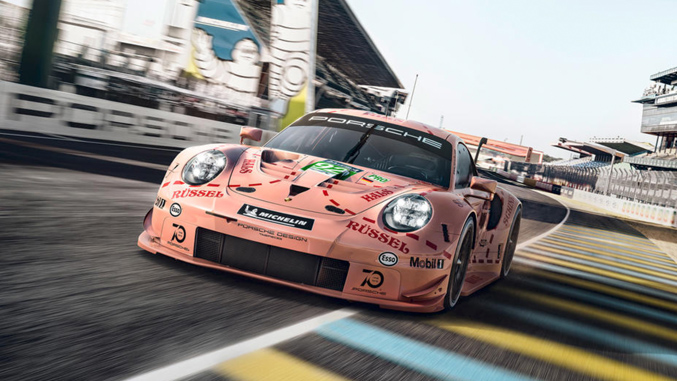Balance Of Performance Vindicated At Le Mans?

Balance Of Performance (BOP) systems commonly used in WEC, IMSA and Pirelli World Challenge get quite a bit of heat from drivers. One common critique is philosophical in that there are drivers who simply don't like alterations to the pace of cars that neutralize technical advantages. They yearn for an era when the organizers issued some technical rules and then teams did their best to build the fastest cars.
The problem here, of course, is that technical wars often led to boring races because one technical solution was superior and that car with that solution ran away with the season (see: 1973 Porsche 917-30). The other problem with the non-BOP world is that automotive OEMs are a significant part of the financing for modern pro sports car racing, and they don't want a money war and they don't want to be embarrassed on track. BOP addresses both issues, though it really doesn't answer the philosophical objection which is an objection to the goals of BOP. The 24 Hours of Le Mans in 2018 doesn't address that (or if it does, it is by exception in that it shows that in long endurance races, when BOP is working as claimed, it doesn't always lead to close racing).
The other common critique of BOP is that it makes winning into a political game. This is a form of conspiracy theory, and so probably can never be disproven. But, we think, it is worth noting when the data seem to suggest that BOP is working as it should. Our impression is that we just had a demonstration of this at the 24 Hours of Le Mans.
For those with open minds, let's review. BOP is designed to have cars in a class deliver the same theoretical lap times over the course of the different tracks run during a season. It is intended to make drivers matter because it equalizes the physics of the car (removing drivers from the equation while setting BOP). It is also intended to allow different cars to make lap times different ways. And it is intended to allow some cars to be better on some tracks while being worse on others.
At the same time, BOP is not intended to solve all pace problems. To take an extreme example, if I could enter my Mazda MX-5 in GTE Pro (assuming it met the rules) it still might not be fast enough to get balanced to the same lap times as the competitive cars. The WEC is not going to BOP the Ford GTs and 911 RSRs all the way down to my MX-5's pace. Obviously, real GTE Pro cars don't have anything like that basic performance deficit, but they may have parameters (e.g. weight or reliability) that limit BOP adjustments. New cars can also lack sufficient data history for BOP to nail the pace of the car. This appears to be what happened to the new Aston Martin Racing Vantages at Le Mans. BOP pretty obviously didn't equalize them, and we assume that is because it couldn't erase their top speed deficit or the attempted adjustment right before the race was too little too late (saying BOP is imperfectly and iteratively applied is not the same as saying it is political BS).
If you understand the above, looking at any one race generally won't necessarily tell you much about whether BOP is working. Le Mans, though, is a little different, because it is such a big deal there is an effort to make BOP work there specifically. BOP for Le Mans operates outside of the normal automatic WEC system. And if you look at the data for Le Mans, it appears that BOP worked pretty well:

Looking at the fastest 50 laps, the #68 Ford was fastest, followed by the #63 Corvette, followed by the second place #91 Porsche. The 4th, 5th and 6th fastest cars were Fords, followed by the race-winning Porsche. The #82 BMW had a similar pace to the winning Porsche. Data here are from The B Pillar: https://twitter.com/thebpillar/status/1008715265532624896
Of course, in endurance racing, breakdowns can play a big part in overall results (note that the #94 Porsche and the #64 Corvette may not have representative data for this reason). That's part of what makes the 2018 Le Mans race so interesting. The top Porsches, Fords and Corvette basically didn't break. And the fastest car didn't win, the 7th fastest car did. That suggests that BOP pretty much worked. Which means that driver skill over hundreds of laps, safety car luck or strategy, pit work, tire management and fuel efficiency did the job. Setup and team tuning within the BOP also matter (e.g. the BOP model uses static wind tunnel data, and different setups can have different pitch or yaw sensitivities, which then deviate from the Lift/Drag per Reynolds number used in the model). The other way of putting this is that BOP didn't make Porsche obviously the fastest car with the result that the winning car was a foregone conclusion. BOP instead made the top cars about the same on raw pace, and then other factors determined the winner.
Another way to see that the #92 Porsche was not the fastest is to look at the best 25 laps by driver:

#92 shows up 13th when ranked by average lap time of its fastest driver and 9th when ranked by fastest lap. It is just difficult to argue that Porsche lobbied for a better BOP for the 911 RSRs and as a result they won the race.
The more interesting enquiry than questioning the BOP system itself might seem to be to ask: did Ford do something to lose the race that they could learn from? Probably not, and we see this in the results of the #91 Porsche. It seems to have been the faster of the two Manthey Porsches (#91 and #92) and yet #91 finished second. Relatively early in the race, Porsche split #91 and #92 onto different pit cycles and the #92 benefitted from that timing when the unusual Le Mans safety car rules (occasioned by the long track) were applied a bit later. This gave #92 a 2 minute or so lead, which was one that neither #91 or the front-running Fords or Corvette could close on sheer pace. So, safety car rules to a degree determined the winner, but in a sense those rules were determinative because BOP made the cars basically equal. In other words, we can see that differential BOP didn't determine the race because #91 and #92 had the same BOP and #91 couldn't close a gap created completely by non-BOP factors. Further, we can see that differential BOP didn't determine the race because the #68 Ford had about the same pace as the #91 Porsche for all intents and purposes. Differential (i.e. unfair due to political lobbying) BOP is the accusation, but the data don't suggest that was happening.
BOP seems to have done its intended work. You may not like the goal of BOP. You may not like the team that benefitted from BOP equalization. But it seems that whoever benefits from BOP is someone who worked non-BOP factors well or was lucky, not someone who gamed the BOP system.


















